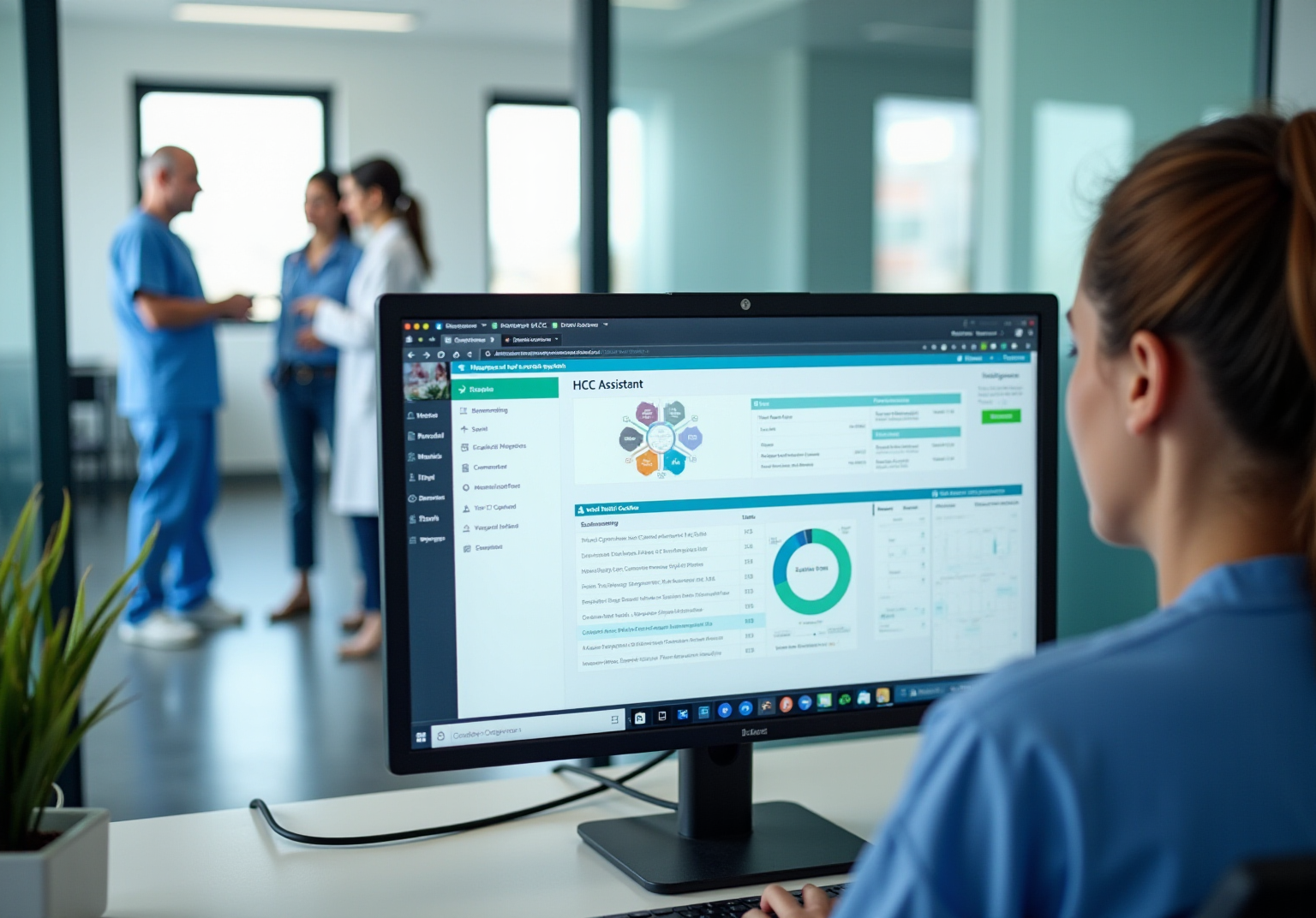
The article provides an overview of seven key trends in AI that are revolutionizing patient care within healthcare settings. These trends encompass advancements in AI-driven diagnostics, telemedicine, robotic surgery, and mental health support. Each of these innovations not only enhances patient outcomes but also improves operational efficiency and personalizes care through cutting-edge technologies and data management practices.
The healthcare landscape is experiencing a seismic shift, propelled by the rapid integration of artificial intelligence (AI) technologies. From enhancing diagnostic accuracy to streamlining patient care processes, AI transcends mere buzzword status; it serves as a catalyst for transformative change. This article explores seven key trends in AI that are reshaping patient care, providing insights into how these innovations are enhancing outcomes and operational efficiency. As these technologies continue to evolve, one must consider: are healthcare providers adequately prepared to embrace the challenges and opportunities that AI presents?
The HCC Assistant by Inferscience harnesses advanced AI and natural language processing to automate the gathering and analysis of clinical information, delivering real-time coding recommendations that significantly enhance the precision of Hierarchical Condition Category (HCC) coding. This tool is essential for maximizing Risk Adjustment Factor (RAF) scores, which are vital for securing appropriate funding from Medicare Advantage contracts.
By seamlessly integrating with electronic health records (EHRs), the HCC Assistant alleviates the administrative burden on medical providers while consolidating patient information, enabling them to concentrate on patient care and ensuring compliance with Medicare regulations. This innovation positions Inferscience as a leader in medical technology.
Recent advancements reveal that medical organizations employing AI in healthcare trends, such as the HCC Assistant, have experienced improved coding accuracy and efficiency. For example, studies indicate a potential reduction in hospital readmissions by up to 50% when predictive analytics are utilized.
As the medical landscape evolves, the HCC Assistant exemplifies how AI in healthcare trends can transform risk adjustment processes, ultimately enhancing care for individuals and operational effectiveness. To fully capitalize on these advantages, CFOs should contemplate integrating the HCC Assistant into their systems to streamline workflows and bolster financial outcomes.

AI in healthcare trends is fundamentally transforming how professionals in the field recognize and manage medical conditions through the use of AI-powered diagnostic instruments. By leveraging advanced algorithms to analyze extensive datasets, these systems uncover patterns and anomalies that may elude human practitioners. Notably, AI algorithms have achieved an impressive accuracy rate of 94% in detecting tumors within medical images, significantly surpassing traditional diagnostic methods. This capability not only enhances diagnostic precision but also facilitates earlier interventions—crucial for improving patient outcomes.
Moreover, healthcare providers utilizing AI in healthcare trends for predictive analytics have reported up to a 50% reduction in hospital readmissions. This showcases the potential of these technologies to lower healthcare costs while simultaneously enhancing the quality of care. The effectiveness of AI in diagnostics is further bolstered by robust database management systems, which ensure precise, current, and accessible information. These systems optimize workflows, minimize errors in record keeping, and provide the necessary data for informed decision-making.
As the integration of AI in healthcare trends continues to evolve, it becomes increasingly evident that these innovations, supported by efficient database management, play a pivotal role in shaping a more effective and efficient medical landscape.

Generative AI is revolutionizing the personalization of individual experiences in medical care. By meticulously analyzing individual data—such as medical history, preferences, and treatment responses—generative AI crafts tailored treatment plans and communication strategies. This advanced technology empowers healthcare providers to connect with individuals more effectively, ensuring that care is not only efficient but also customized to meet specific needs.
As a result, individuals demonstrate greater compliance with treatment plans, which is critical, given that studies indicate that 50% or fewer individuals persist with their prescribed therapy after one year across various diseases. Moreover, medication nonadherence accounts for up to 25% of all hospitalizations in the United States each year, underscoring the necessity of personalized approaches.
Michelle Thompson, a family medicine expert, articulates this advantage: “AI has enabled me, as a doctor, to be 100% present for those I care for.” This alignment between care and individual profiles fosters improved health outcomes and heightened satisfaction levels, highlighting the pivotal role of AI in healthcare trends.
For CFOs, enhancing medication adherence through personalized care could lead to a reduction in healthcare costs by approximately $100 to $300 billion annually, rendering it a financially prudent strategy. A significant case study in personalized medicine illustrates how AI in healthcare trends customizes treatments based on genetic and lifestyle information, further demonstrating the transformative potential of AI in enhancing care for individuals.
Predictive analytics serves as a powerful tool in the healthcare sector, leveraging comprehensive information analysis to anticipate individual needs and identify potential wellness risks before they escalate. By examining historical data in conjunction with current trends, medical providers can implement targeted interventions for high-risk individuals. This proactive approach significantly enhances care and improves health outcomes.
Furthermore, it not only reduces costs associated with emergency interventions and hospital readmissions but also streamlines risk adjustment workflows through effective HCC coding tools. For instance, a recent study demonstrated that integrating AI in healthcare trends through AI-informed care management led to a remarkable 27% decrease in potentially avoidable hospital admissions among high-risk individuals.
As predictive analytics continues to evolve, its integration into medical workflows—alongside NLP tools for precise coding—will become increasingly vital for effective risk management, ultimately fostering a more efficient medical system in line with AI in healthcare trends.

The trends of AI in healthcare are revolutionizing telemedicine by facilitating efficient remote patient monitoring. Wearable devices and mobile applications empower medical professionals to continuously track vital health metrics, such as heart rate and blood pressure. Advanced AI algorithms in healthcare trends analyze this data in real-time, promptly alerting providers to any concerning changes that may require immediate intervention. This capability significantly enhances safety for individuals and enables timely responses, thereby reducing the necessity for in-person visits and improving overall access to medical services.
Notably, 88% of doctors express a preference for individuals to monitor their wellness at home, underscoring the growing reliance on technology for proactive health management. Furthermore, the integration of wearable technology reflects AI in healthcare trends and has the potential to decrease hospital costs by as much as 16% in the coming years, providing a compelling financial incentive for healthcare organizations. Research indicates that individuals involved in remote monitoring programs experience improved health outcomes and increased control over their well-being, with 86% believing that wearable medical devices enhance their health results.
As wearable technology continues to advance, its role in enhancing care and safety for individuals is poised to expand significantly.
Robotic surgery is undergoing a remarkable transformation through AI technologies, significantly enhancing precision and improving outcomes for patients. AI systems equip surgeons with real-time data and analytics during procedures, facilitating more accurate movements and minimizing the risk of complications.
For instance, AI can analyze surgical videos to identify optimal techniques and suggest real-time adjustments, thereby augmenting the surgeon’s capabilities. This integration not only results in shorter recovery times but also reduces postoperative complications, with studies indicating that AI-driven robotic systems can lower reoperation rates by as much as 15%.
Furthermore, fewer postoperative complications lead to savings of $2,000 to $3,000 per surgery, underscoring the financial advantages of AI in surgical procedures. Recent advancements in AI have also enhanced surgical accuracy across various procedures, allowing for better delineation between tumor and healthy tissue, which is crucial for successful outcomes.
As noted, ‘The integration of robotics and AI in healthcare trends represents a transformative advancement in modern healthcare, promising enhanced precision, efficiency, and patient outcomes.’
Overall, the synergy of robotic surgery and AI in healthcare trends is paving the way for a new era of surgical excellence, highlighting the importance of ongoing research and development to maximize AI’s potential in improving surgical outcomes.

AI is revolutionizing mental well-being support by introducing innovative solutions that significantly enhance accessibility and personalization. AI-driven chatbots, such as Woebot and Wysa, provide immediate assistance to individuals seeking help, thereby making mental wellness resources more readily available. These tools employ advanced algorithms to analyze user interactions, enabling them to customize responses and interventions that are both relevant and effective. For instance, studies have demonstrated that chatbot interventions can clinically alleviate symptoms of depression, underscoring their potential as effective adjuncts to traditional therapies.
As mental wellness gains recognition as a crucial component of overall well-being, AI solutions play a vital role in connecting patients with the care they require. The continuous availability of these chatbots ensures that support is accessible around the clock, addressing the significant shortage of mental health specialists, particularly in underserved areas. Moreover, the anonymity afforded by chatbots encourages individuals to engage in discussions about sensitive issues without the fear of judgment, thereby reducing stigma and facilitating earlier intervention.
Recent advancements in AI technology have further bolstered the effectiveness of these interventions. Research indicates that users frequently feel supported by AI chatbots, even when they recognize they are interacting with artificial agents. This adaptability allows AI to evolve based on user needs, ensuring that mental wellness support remains relevant and effective over time. As highlighted by experts in the field, the integration of AI in healthcare trends, specifically in mental health services, represents a promising avenue for enhancing accessibility and addressing the challenges that many individuals face in seeking assistance.

AI is fundamentally transforming electronic health records (EHRs) by significantly enhancing information management capabilities. By automating routine tasks such as information entry and coding, AI alleviates the administrative burden on healthcare professionals, allowing them to focus more on patient care. Effective database management practices, including the use of structured query language (SQL) for information retrieval and the implementation of validation protocols, are crucial in this context. These practices ensure that information is organized, accurate, and accessible, which is essential for the successful implementation of AI-driven solutions.
For instance, AI-driven systems can analyze vast amounts of health data to identify trends and generate actionable insights, which are vital for informed clinical decision-making. This evolution not only enhances the accuracy of patient records but also facilitates the delivery of more personalized and effective care. As we approach 2025, the incorporation of AI in healthcare trends, particularly within EHR systems and supported by robust database management practices, will be essential for improving medical service delivery. Forecasts suggest that the AI in healthcare trends could push the medical market to reach $188 billion by 2030, underscoring the urgency for healthcare organizations to adapt.
Practical implementations, such as AI-supported programming tools, have already demonstrated improved effectiveness and precision in information management. This highlights AI’s capability to transform medical practices while enhancing provider efficiency and adherence. Case studies from leading healthcare organizations illustrate how streamlined HCC coding processes have saved time for primary care providers while unlocking higher Medicare reimbursements. These examples further emphasize the benefits of integrating AI in healthcare trends with effective database management, making a compelling case for its adoption in the healthcare sector.

AI is revolutionizing clinical trials, significantly enhancing efficiency and effectiveness across various processes. By streamlining patient recruitment and information analysis, AI algorithms improve trial design and execution, ultimately shortening timelines and reducing expenses. For instance, AI can identify suitable candidates for trials based on their medical history and current health status, ensuring a more targeted and efficient recruitment process. This capability has been shown to enhance enrollment rates by 10 to 20 percent, addressing a common challenge where over two-thirds of R&D firms report project delays due to absent information.
Moreover, AI’s ability to analyze trial information in real-time empowers researchers to make informed decisions swiftly, adjusting protocols as necessary based on emerging insights. This dynamic approach not only enhances safety for participants but also improves trial outcomes. A notable example is the application of generative AI in drafting clinical study reports (CSRs), which has reduced timelines by 40%, allowing reports to be completed in five to eight weeks instead of eight to 14 weeks. This advancement has increased the net present value per asset by $15 million to $30 million, underscoring the financial benefits of integrating AI.
As the demand for innovative therapies continues to rise, the integration of AI in healthcare trends is becoming essential for accelerating the development of new treatments. The future of clinical research will likely see an even greater reliance on AI technologies, ensuring that trials are not only more efficient but also more patient-centered.

AI is increasingly recognized as a cornerstone of cybersecurity within medical environments, playing an essential role in safeguarding sensitive client information from emerging threats. By leveraging advanced algorithms, AI monitors network activity in real-time, promptly identifying suspicious behavior and potential breaches before they escalate. For instance, AI-driven systems have demonstrated their ability to enhance encryption and access controls, ensuring that individual information remains secure and compliant with stringent regulations. As medical organizations continue to digitize their operations, the integration of AI in healthcare trends becomes imperative for protecting individual information and maintaining trust in clinical systems.
Recent advancements in AI technologies have further bolstered these capabilities, empowering healthcare providers to proactively address vulnerabilities and mitigate risks associated with breaches. This proactive stance not only elevates patient safety but also aligns with regulatory requirements, positioning AI as an indispensable ally in the ongoing battle against cyber threats. With the average cost of a data breach in the U.S. approaching $10 million, the financial ramifications of investing in AI-driven cybersecurity solutions are substantial for CFOs.
As William Jepma aptly states, ‘AI is the defining force of our time—reshaping how we live, work, and secure the digital world.’ Moreover, the rising incidence of cybercrime, fueled by an increase in internet users, highlights the urgent necessity for robust solutions, particularly focusing on AI in healthcare trends for cybersecurity. Organizations must also ensure that AI systems are secured throughout their lifecycle to effectively combat these threats.

The integration of AI in healthcare signifies a transformative shift, enhancing patient care and operational efficiency across various domains. By improving diagnostic accuracy and personalizing treatment plans, AI technologies are redefining the standards of medical practice. This ensures that patient outcomes are prioritized while streamlining administrative processes.
Key trends such as:
illustrate the profound impact of these innovations. Tools like the Inferscience HCC Assistant are revolutionizing risk adjustment, while generative AI tailors patient experiences, ensuring that care is not only effective but also personalized. Furthermore, advancements in telemedicine and mental health support underscore the growing importance of accessibility and individualized care in today’s healthcare landscape.
As the healthcare sector continues to embrace these AI trends, stakeholders must recognize the urgency of adopting these technologies to remain competitive and responsive to patient needs. The future of healthcare is undeniably intertwined with AI, and organizations are encouraged to invest in these advancements to enhance care delivery, improve patient outcomes, and safeguard sensitive information against emerging cyber threats. Embracing AI is not merely a strategic move; it is a necessary evolution in the quest for excellence in patient care.